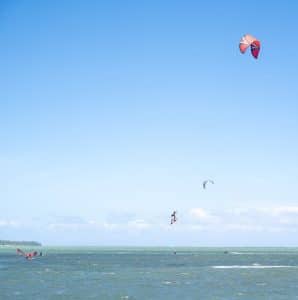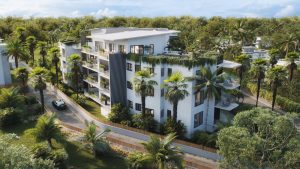Share this article
Be the first to know about our new projects.
2Futures has many new luxury projects in the pipeline. Get notified before the public when there’s a new launch. Benefit from early bird specials.
Life on a tropical island is endlessly alluring for those who love a warm climate, laidback lifestyle, ocean swims, and forest walks. If you had to pick one as a permanent home, how would you choose between moving to Mauritius and Seychelles, for example?
Mauritius is one island surrounded by reefs and beaches, whereas the Seychelles Archipelago comprises 115 islands, some significant and developed and others the opposite. Yet Seychelles is much smaller than Mauritius, at approximately 455 sq km compared to 2,040 sq km. Its population is also far smaller, at 107,984 compared to 1.3 million in Mauritius, according to Worldometer (2024).

Golf anyone? Mauritius has some of the top-rated courses designed by world experts. Padel tennis courts are popping up to meet increasing demand.
If you prefer a more sedentary way to pass the time but still want to be outdoors, you can book a 4×4 to explore. There are so many landscapes and waterfalls to discover – the Chamarel 7 Coloured Earth Geopark is just one destination worth visiting.
Conservation is a priority in Seychelles, so no motorised sports are allowed. The result is terrific diving and snorkelling conditions. You can also go big game and salt-water fly-fishing, swim with harmless whale sharks, visit a colony of giant tortoises and enjoy activities like windsurfing and sailing.
Mauritius offers a diverse lifestyle with a mix of cultures, beautiful beaches, and a thriving culinary scene. You can get a sense of that when you visit the buzzing markets of Port Louis, Grand Baie and Flacq or search for the heartbeat of Mauritius – live traditional sega music.
Food-wise, you’ll detect influences from India, Africa, China and Europe. Taste it at the market or on the street, purchasing from the vendors at their barrows stocked with things like gateaux piments, merveilles and samosas. The locals love chilli, so be warned.
Seychelles, known for its stunning beaches and nature reserves, has a more relaxed and secluded atmosphere.
Both countries generally have a welcoming environment for expats, but Mauritius, with its diverse expat community, is seen to offer a more inclusive atmosphere. English is widely spoken in Mauritius and Seychelles, making communication easy for expats. Additionally, French and Creole are commonly spoken in Mauritius.
While Mauritius and Seychelles offer attractive features, Mauritius is more favourable for real estate investment due to its investor-friendly policies, diverse lifestyle, robust infrastructure, and well-established business environment.
Mauritius offers a pathway to permanent residency through different schemes, including real estate investment, and the Government is known for its investor-friendly policies. A minimum investment of USD 375,000 secures permanent residency and the right to live, work and retire in Mauritius.
According to investment migration specialists Henley & Partners, permit processing takes six to eight months. Their recent research also shows a strong correlation between economic performance, passport power, and countries that host investment migration programmes (which Seychelles doesn’t).

Expats in Mauritius can purchase luxury property in government-approved schemes. When the Mauritius residential real estate investment is USD 375,000 or more, the buyer qualifies for permanent residency for himself and his dependents. This criteria extends to “spouses or partners, parents, and unmarried, financially dependent children (including stepchildren and adopted children) of any age who are not gainfully occupied”, according to Henley & Partners.
Residency can also be obtained through work or self-employment, with specific income criteria. Retirees need to be 50 years old and meet financial requirements.
Foreign residents in Mauritius can open a current account in either Mauritian rupees or foreign currency. Foreign currency accounts can only receive funds through domestic and international bank transfers, with the minimum deposit requirement determined by the internal rules of selected banks.
Seychelles offers residency permits for investors. Moreover, permit holders must live in Seychelles for at least five days each month of the terms of the permit. There are also fees charged to cover expenses incurred by the Government for “care, treatment, maintenance within or removal from Seychelles of the permit holder and their dependents.” Permit holders may not get free medical services or social security benefits. They must also find ways of contributing to Seychelles’ economic, social or cultural life.
In Seychelles, expats can apply for permits for gainful occupation, ordinary residence, dependent residence (for family), or student residence. Each permit serves a different purpose: employment, family ties, or education.
Mauritius has a favourable tax regime, with no capital gains, inheritance, or wealth tax. Seychelles also has no capital gains tax, but the tax structure may vary for non-residents.
Tax residency in Mauritius is determined by the number of days an individual spends in the country during the tax year (July 1 to June 30). Automatic residency applies if the individual’s domicile is in Mauritius and there is no permanent abode outside Mauritius or if they spend 183 or more days in Mauritius during the tax year or 270 or more days in the tax year and the two preceding years.
Mauritius generally has a streamlined residency and property ownership application process, making it attractive for investors. Seychelles also facilitates foreign investment, but the process might be slightly more complex.
Mauritius and Seychelles have a relatively high cost of living because so much has to be imported, but this varies according to lifestyle choices. According to Numbeo, the world’s largest cost of living database, the estimated monthly costs for a family of four living in Mauritius, excluding rent, is MUR 94,837.6. By comparison, Seychelles is MUR 149,204.21 as of 31 January 2024.
Living Cost, a crowdsourced database with a cost of living calculator updated November 2023, rates Mauritius (MUR 32 929) 52% less expensive than the Seychelles (MUR 69 319) for one person. Their calculation for the cost of living for a family in Mauritius is MUR 84 561 compared to MUR 174,591 in Seychelles.
Both Mauritius and Seychelles have reputable medical facilities. Mauritius has a well-developed healthcare infrastructure with modern hospitals and medical services.
Public healthcare in Mauritius is free for residents but not non-residents. The latter are advised to have health insurance, especially if they want to access the private healthcare system.
Mauritius has a well-established education system, with international schools offering high-quality education. Seychelles also has good schools, but the range of international schools might be more extensive in Mauritius.
Mauritius is well-connected globally, with a modern airport and seaport, making travel convenient. Emirates, Air France, Air Austral, British Airways are some airlines that fly to the island. Being an archipelago, Seychelles may have fewer direct flight options, potentially resulting in longer travel times. Qatar, Emirates, Turkish Airlines, Ethiopian Airlines, and Edelweiss are a few of the airlines on this travel route.